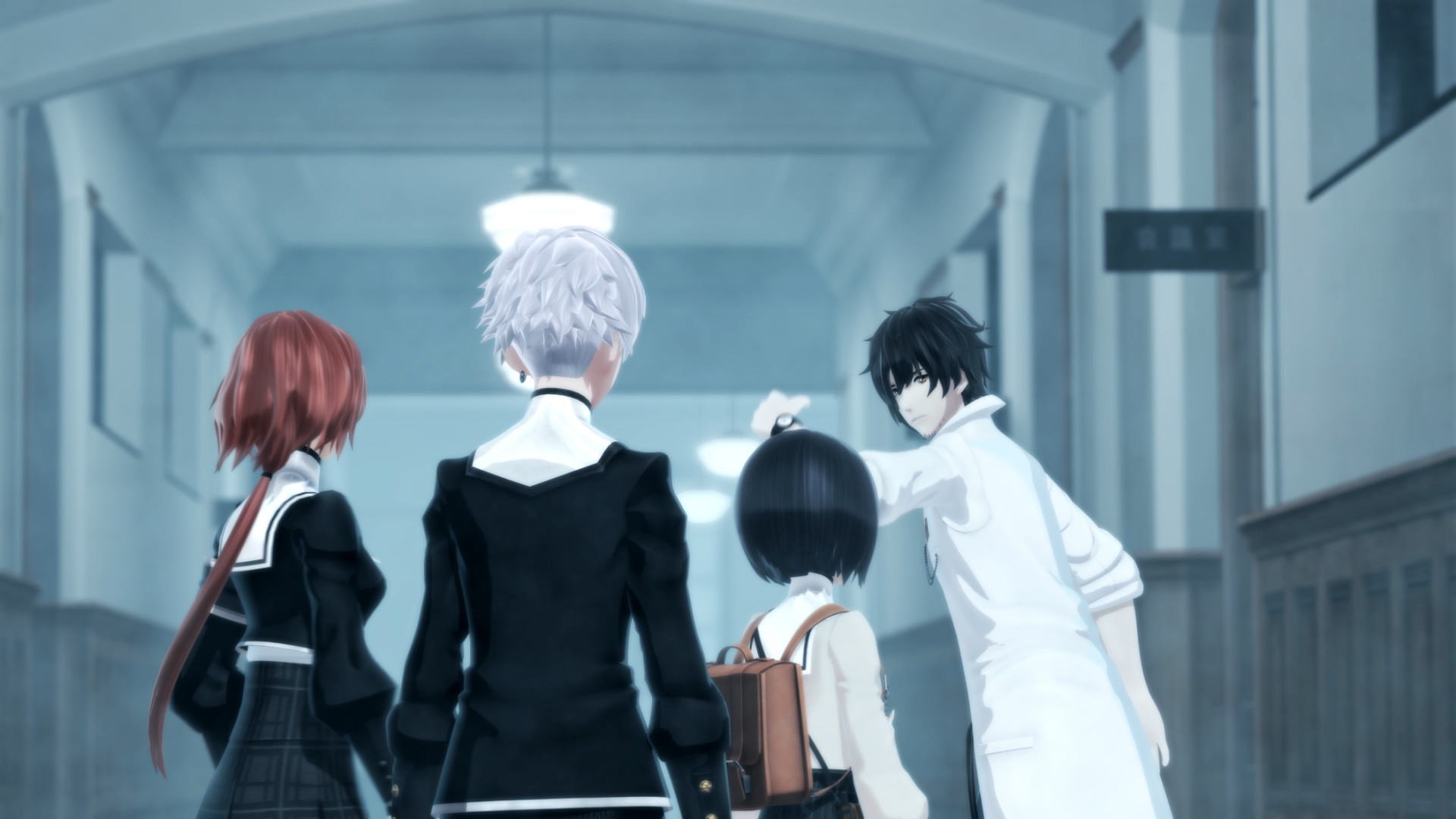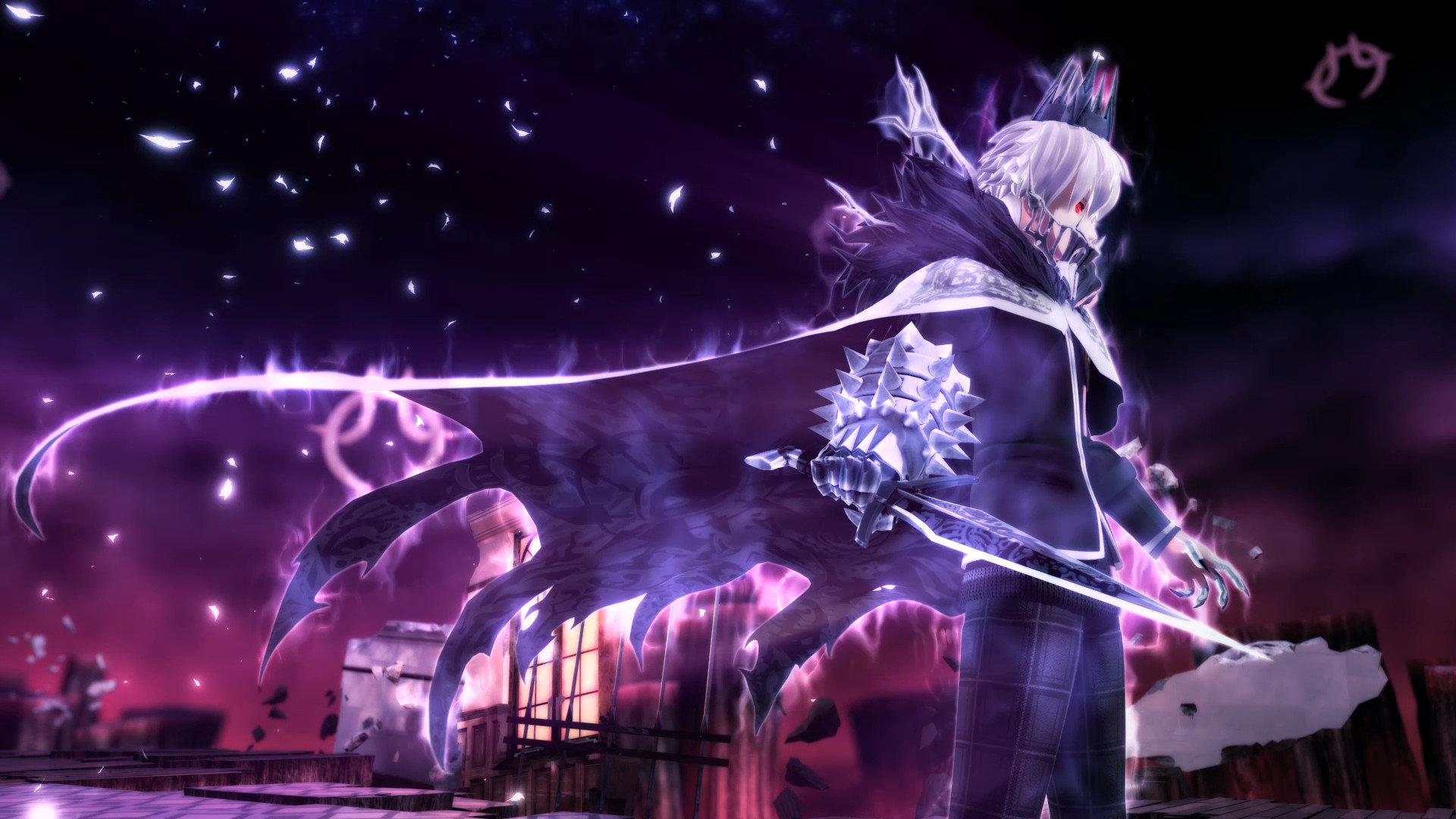
Developed by a team of former Atlus devs who were instrumental in the earlier Shin Megami Tensei games, Monark comes with inherent cache, and in turn, expectations. In many ways, the game very much aligns with what you’d expect it to be, given the talent involved- it can be philosophical and strangely dark and twisted at times, and the story it weaves around those themes is often engrossing. Disappointingly, however, more often than not, it feels like a half-baked experience, one that could have done so much more with many of its genuinely intriguing gameplay ideas if it had been thought out better and polished up a little bit more.
Monark is set in Shin Mikado Academy, an ordinary high school stuck in extraordinary circumstances. An ethereal barrier surrounds the school, preventing anyone from going in or out, while a mysterious mist enveloping the area is slowly driving everyone within it insane. It falls to you, an amnesiac student, to dive into the daeomic realm known as the Otherworld, figure out what’s causing this whole mess, and then put things right.
It’s an engaging narrative premise, for which Monark deserves a lot of credit. Unsurprisingly for a game made by former Megami Tensei devs, the story here can often get deeply philosophical, and the emphasis it places on its theme is an overriding defining trait of the entire experience. That’s often let down by the writing, which can feel a bit too on-the-nose and ham-fisted at times, while the voice acting is also wildly inconsistent, but there’s more than enough to Monark’s story to keep you engaged for as long as you can put up with its gameplay.
"More often than not, Monark feels like a half-baked experience, one that could have done so much more with many of its genuinely intriguing gameplay ideas if it had been thought out better and polished up a little bit more."
I say “put up with it”, because there’s so much about the game that will feel actively hostile one way or another, either because of mind-numbing repetition or just poor design decisions. Monark’s larger structure sees you going from one building of the school to next to clear it of the fog that envelops it by defeating the Pactbreaker presiding over that area, and conceptually, it’s a task fraught with risk and tension. Spending too much time in the mist will drive up your insanity meter, and when it reaches its maximum limit, it’ll be game over- except it’s hardly anything more than a minor inconvenience, because when you restart, you can just fast travel back to a checkpoint that’ll put your pretty close to where you were before.
It doesn’t help that the actual act of exploring quickly gets boring. Outside of combat, the bulk of the game focuses on meeting with students, learning more about them, and then using that knowledge to solve puzzles- only the puzzles range from being ridiculously easy and requiring little to no engagement to being frustratingly opaque and blocking progress for far longer than they need to. The environments that you explore all quickly blend into each other as well, because there’s nothing visually interesting going on in most of them- it’s all just a collection of desks, hallways, and classrooms. It’s a shame that the game’s level design doesn’t show nearly as much ambition as its story does, leading to frustratingly repetitive structuring and gameplay.
Combat, on the other hand, does have some redeeming qualities. Blending a tactical turn-based JRPG system with free movement, Monark’s combat makes use of its Madness mechanics in interesting ways, and that, combined with things such as your positioning, your party members, and more can lead to some surprisingly complex and intriguing battle mechanics. Sadly, this is another area that is let down by other significant deficiencies.
"The environments that you explore all quickly blend into each other as well, because there’s nothing visually interesting going on in most of them- it’s all just a collection of desks, hallways, and classrooms. It’s a shame that the game’s level design doesn’t show nearly as much ambition as its story does, leading to frustratingly repetitive structuring and gameplay."
For starters, the enemy variety here is abysmal. More often than not, you’ll be fighting the same (or similar) skeletal enemies again and again, and that repetition quickly rubs the appeal off of Monark’s combat systems. More importantly, and more egregiously, this is a ridiculously grindy game. You level your characters up using a currency known as Spirit, which you get at the end of every battle, but you don’t have a fixed party in Monark, which means you’ll often be wasting Spirit on characters who’re not going to stick around for long anyway.
Worse still is the fact that often these new characters that temporarily join your party are severely under-leveled, which means you’re pretty much forced to grind and bring them up to a respectable level. Repetition is an overriding theme for much of the experience, as you may have gathered by now, and that excessive reliance on grinding is something else that adds to that. Again, it’s a real shame, because on a mechanical level, there’s a lot to like about Monark’s combat system- it’s just never allowed to flourish the way it should have been.
Monark’s issues are egregious no matter how you look at them, but they feel doubly so because on paper, there’s a lot to like here. The way the game uses its seemingly typical Japanese high school setting and blends it with its philosophical bent is very reminiscent of the Shin Megami Tensei games, but even more impressive is how it sprinkles in elements of psychological horror throughout the experience. The first few times you’re traversing through the fog, it feels genuinely unsettling. Your initial encounters with students who’re slowly losing their minds are creepy in all the right ways, and the palpable dread of not knowing what awaits around the corner, all while your own insanity slowly creeps up, makes up for a very unique vibe that we don’t get enough of in this genre. Sadly, it all falls apart as you get deeper into the experience.
"Your initial encounters with students who’re slowly losing their minds are creepy in all the right ways, and the palpable dread of not knowing what awaits around the corner, all while your own insanity slowly creeps up, makes up for a very unique vibe that we don’t get enough of in this genre. Sadly, it all falls apart as you get deeper into the experience."
If Monark had been in development a little longer, it could have turned into something special. Better design could have made the environments more varied, the exploration more interesting, and the puzzles more engaging. More time to work on the game could have allowed the developers to add more variety to the game’s battles with more interesting enemies that actually compel you to use the complex mechanics the way they ought to be. And just plain smarter design decisions could have significantly cut back on the grinding, which artificially pads out the experience’s runtime to an almost ridiculous degree.
As it stands right now, this is a game that seems impressive when you read or hear about it, but falls flat when you actually get down to playing it. Monark has a lot of great ideas, but ideas are only one half of any gaming experience- the execution is just as important, and often even more so, and unfortunately, Monark’s execution is inconsistent at best, and frustratingly bad at worst.
This game was reviewed on the PlayStation 5.
Interesting narrative premise; Unique psychological horror vibe; Mechanically complex combat system.
Boring exploration in bland environments; Poorly designed levels; Too repetitive; Lack of enemy variety; Excessive reliance on grinding.



















